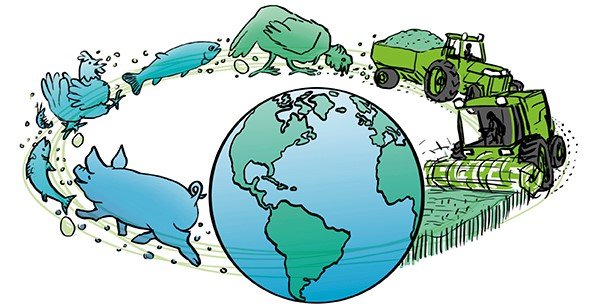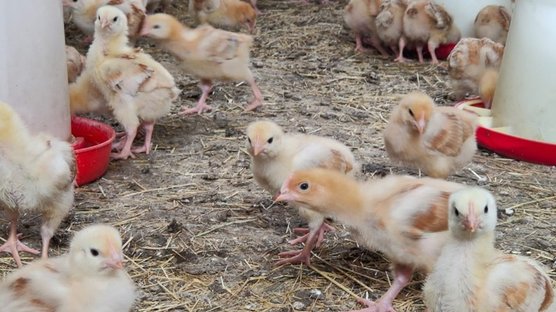
Published on May 26, 2020
Securing the global food supply
With the rising worldwide demand for food, the current COVID-19 pandemic and all the challenges to come, we have sustainable animal breeding on top of mind. Our core will always be to deliver high-quality animal genetics. Why? Because securing the global food supply is and will be of the highest importance.
Hendrix Genetics has recognized for a long time that there is far more than just efficiency to consider in producing food. What we do today has an impact on tomorrow. Not just our own future, but that of generations to come. No matter the species, continuous improvement in breeding is our number one objective. Innovative, genetic solutions are key to solving the need to feed the world in a more sustainable way. Hendrix Genetics has invested in many initiatives that enhance our breeding programs for all species. Each being uniquely important in finding new ways to study animal traits and collect breeding values. Delivering the next generation of healthy, efficient animals that contribute to better breeding today, for a brighter life tomorrow.
Continuous improvement of our genetics
With our balanced breeding programs contributing to improved genetic potential of our breeds to help the industry reduce impact on the environment we are also able to improve animal welfare traits creating more resilient animals.
Layers – Chronic stress is at the core of many of the challenges in egg production. As member of the Chicken Stress consortium we aim to understand how the stress response is regulated in the avian brain. This study comprised of 14 projects into different factors of poultry stress responsiveness has the objective to change industry conditions to maximize welfare and productivity.
Traditional Poultry – Part of the SAPPSA project is aimed at improving chicken genetics tailored to the local needs and environmental pressures so that these birds will perform well in various climates. Hendrix Genetics has set up several field tests in different countries with the progeny of our breeding lines to identify the most suitable genetics to thrive under the challenging African conditions.
Turkeys – Genome Canada’s Genomic Application Partnership Program (GAPP) grants $6 million of funding to Hendrix Genetics for genomic selection project to improve the health, welfare and productivity of Hybrid’s turkeys.
Aquaculture –Hendrix genetics partnered with The Roslin Institute in Edinburgh, leading genomic selection research on Amoebic Gill Disease to improve production, animal welfare and sustainability in the salmon industry.
Swine – Hendrix Genetics has joined a research alliance to develop pioneering genetic technology. Through the use of precision breeding, this alliance hopes to end the surgical castration of male piglets.
Access to enhanced genetics
Working continuously on the improvement of our high quality animal genetics is only part of the solution to secure global food supply. Access to these genetics for protein producers is the next challenge. Ensuring a broad network for distribution is key to supporting the market with sustainable access to high-quality animal genetics. This is where sustainable animal breeding can contribute to feeding the world through securing a sufficient and safe global food supply.
Hendrix Genetics has completed extensive research in the dynamics of global food markets to anticipate producer needs and has increased the scale of its distribution operations to secure supply chains that help meet these global demands. Across the globe Hendrix Genetics invests continuously in securing easy access to the best eggs, chicks, poults, piglets, smolts and semen.
North America
With high demand for higher quality poultry products, Hendrix Genetics found for an innovative solution and invested in and launched a commercial distribution network allowing commercial turkey growers the opportunity to purchase Hybrid Turkeys genetics direct from the primary breeder.
Hendrix Genetics also invested in a US distribution network to ensure supply to egg farmers across America. Now delivering 60 million-day-old-chicks to the USA, giving the industry access and choice for multiple products, in both white and brown eggs and suitable for a variety of production systems.
Africa/Asia
The Sustainable Access to Poultry Parental Stock to Africa (SAPPSA) project was designed to provide better supply and genetic solutions for African poultry farmers. Through this project, Hendrix Genetics is providing support to local farmers in feeding the growing population with nutritious protein.
South America
Partnered with Nutreco and Ecuacultivos, Hendrix Genetics has Invested in a state-of-the-art shrimp hatchery in Ecuador, delivering high-quality Kona Bay Pacific whiteleg shrimp post larvae to Ecuadorian farmers, delivering value and efficiency to the Ecuadorian industry.
Hypor genetics are becoming widely available across the South American continent through partnerships with leading companies in various countries. These countries include Ecuador, Colombia, the Dominican Republic, Peru, Guatemala, Panama and Costa Rica. As a national distributor of high-quality swine genetics, these companies will produce parent stock sows and terminal boars locally, genetically linked with the strategic nucleus farms in Canada.
Safe worldwide supply
As part of our global standards, we are working to develop a structured biosecurity plan. Once fully completed, the program will include required health status, risk assessments, standard operating procedures (SOPs), health monitoring and screening, training and auditing. This plan also involves minimum standards across all of Hendrix Genetics as well as a structured plan for each species.
Food security starts with biosecurity
With damaging disease risks such as avian influenza, it’s our responsibility to make sure we protect the health of our animals. Our grandparent laying hen farms and hatcheries in Brazil are leading by example and have been awarded compartment status, granted by World Organization for Animal Health (OIE) as well as the breeding complexes, grandparent farms, and hatcheries in the Netherlands. This status allows us the ability to ship to customers all over the world which helps ensure that we are doing our part in fighting the global food challenge.
Transportation
Transporting protocols are also extremely important in preserving the high health of our animals. Biosecurity is key when transportation our animals as this is one of the biggest risks to introducing disease on a farm. Standards have been set for transportation including thoroughly cleaning and disinfecting, downtime, and screening to ensure the health of our animals and decrease the spread of disease risks. Following the implementation of the program and auditing, the biosecurity program will be fine-tuned to develop even more improvements for the future.
Reducing risks
With the risk of disease threats and the impact on our environment, we are committed to protecting the health of our animals as well as the secure supply of genetics for our customers. Biosecurity programs for each species Hendrix Genetics supplies already contains a wide range of measures, but the process of centralizing the protocols is currently in progress. By centralizing the protocols for each species, we can ensure that the best standards are being practiced all over the world.
Hendrix Genetics is dedicated to feeding a growing world population through sustainable animal breeding by delivering a positive and lasting impact on the animals we breed, the people we work with, and the environment in which we operate. We believe that securing the global food supply through our strong supply chains in combination with our high quality animal genetics contribute to better breeding today, for a brighter life tomorrow.



